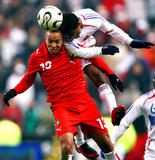by Edward Vivian Scobie
The same degree of intellect and learning was brought by the Moorish conquerors of the Iberian peninsula to Portugal. Like Spain, that country was to be culturally influenced by the Moors. Its association with Africa dates as far back as the fourth and fifth centuries when Africans arrived in southern Europe. But it was in 711 A.D. that they marched in as conquerors under the command of Tarik. To reinforce what has been said earlier these Moors, as the early writers chronicled, were "black or dark people, some being very black."
After the invasion of 711 came other waves of Moors even darker. It was this occupation of Portugal which accounts for the fact that even noble families had absorbed the blood of the Moor.
From that time onwards, racial mixing in Portugal, as in Spain, and elsewhere in Europe which came under the influence of Moors, took place on a large scale. That is why historians claim that "Portugal is in reality a Negroid land," and that when Napoleon explained that "Africa begins at the Pyrenees," he meant every word that he uttered. Even the world-famed shrine in Portugal, Fatima, where Catholic pilgrims from all over the world go in search of miracle cures for their afflictions, owes its origin to the Moors. The story goes that a Portuguese nobleman was so saddened by the death of his wife, a young Moorish beauty whom he had married after her conversion to the Christian faith, that he gave up his title and fortune and entered a monastery. His wife was buried on a high plateau called Sierra de Aire. It is from there that the name of Fatima is derived.
The Moors ruled and occupied Lisbon and the rest of the country until well into the twelfth century. They were finally defeated and driven out by the forces of King Alfonso Henriques, who was aided by English and Flemish crusaders. The scene of this battle was the Castelo de Sao Jorge or, in English, the Castle of St. George. Today, it still stands, overlooking the city of "Lashbuna"--as the Moors named Lisbon.
The defeat of the Moors did not put an end to their influence on Portugal. The African (Moorish) presence can be seen everywhere in Portugal; in the architecture of many of the buildings. They still retain their Moorish design--like the Praca De Toiros--the Bull Ring in Lisbon. A walk through Alfama--the oldest quarter in Lisbon, with its fifteenth century houses, narrow-winding streets--dates back to the time when it was the last settlement of the Moors. Fado singers abound in all corners and bistros of Afalma. Their songs and rhythms owe much to the influence of the Moorish musicians centuries ago. Even the fishing boats on the beaches of Cascais show marked African traces. Called the rabelos, these boats, with their large red or white sails, which also ply on the Douro River to fetch wine from the upper valleys, are reminiscent of the transport boats of Lagos in Nigeria.


























